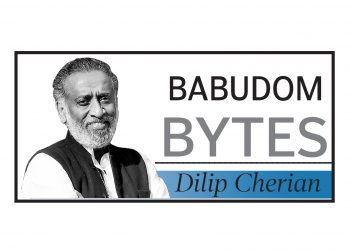The recent case involving K Srinivasan, a 2005-batch IAS officer, in Jharkhand, has evoked a lot of interest in babu circles. The state government has issued four show-cause notices to Srinivasan for “tampering with the contents” of a Cabinet note twice, which is a serious breach of protocol. Sources have informed DKB that the said approved Cabinet note outlined the extension of operations for six Eklavya schools. However, Srinivasan allegedly added two additional sentences without proper authorization, potentially impacting the outflow of funds and raising suspicions of misuse. Further, sources say that by not responding to the show-cause notices, Srinivasan was removed from the post and is currently awaiting his posting.
Senior babus say that government decision-making adheres to established procedures and protocols, ensuring checks and balances to prevent unauthorized modifications. In this case, the addition of two sentences twice without the requisite approval is a serious deviation from governance practices.
Tampering with the Cabinet note is a serious issue and though it was immediately noticed, and the issue raised at various levels, clearly the incident is a wake-up call for the Jharkhand government to review its processes to prevent similar instances in the future.
What’s the next chapter in the ED story?
Terming the third extension to Enforcement Directorate (ED) Director Sanjay Mishra as illegal and fixing his tenure up to the last day of this month was a difficult decision for the Supreme Court. The court not only upheld the Parliament’s decision on the CVC Act and DSPA but also contradicted its previous ruling regarding Mishra’s removal. This outcome seems to have satisfied both the petitioners and the government, although it may not have been the court’s original intention.
Mishra, who had comfortably settled into his role as the ED chief following his third extension, had elevated the ED’s influence, surpassing event that of the Central Bureau of Investigation (CBI), and positioned it as a strategic player in the government’s power play. Now, looking ahead, his future remains uncertain. Sources have informed DKB that there have been discussions about entrusting him with a key responsibility, such as becoming the Governor of a state in the Northeast or South, serving as the high commissioner of India to the UK, or even being appointed as a Union Minister! Such conjecture underscores the consensus on Mishra’s competence and his indispensability to the Modi sarkar.
As for Mishra’s successor, several names are being considered. Pravin Kumar, recently appointed as a Central Board of Direct Taxes (CBDT) member, is reportedly a frontrunner for the coveted post. Pankaj Kumar Mishra, former Director of the Financial Intelligence Unit and an empanelled secretary-level officer is also a strong contender, while Seemanchala Dash, a former principal special director in the ED, has also emerged as a potential candidate. Another probable is a highly trusted lady officer who is currently with the SSB.
While an IAS officer may be appointed as the next ED chief, it seems improbable given the ED’s current momentum, especially in the lead-up to the 2024 Lok Sabha polls. Regardless of who succeeds Mishra, senior babus concur that filling his shoes will be daunting.
New dilemma for retired babus
The recent introduction of stringent measures by the Department of Personnel and Training (DoPT) to prevent retired babus from disclosing classified information has raised the question of the delicate balance between national security and democratic principles.
Undoubtedly, there have been instances where retired IAS, IPS and IFS babus have made sensational disclosures in their books, revealing information that should have remained under wraps, either because of its confidential nature or because of its potential to embarrass the government by exposing its flaws or misgovernance. While the need to curb such practices is instinctive for those in power, how can we ensure that the regulations implemented do not become tools to stifle dissent and limit the public’s access to information?
The All India Services (Death-cum-Retirement-Benefits) Amendment Rules, 2023, raises serious concerns about the government’s intentions. The amended rules link pension entitlement to maintaining good conduct and empower the Central government to suspend the pension of those convicted of serious offences or found guilty of post-retirement misconduct. Additionally, retired officers who have served in intelligence departments now have to seek permission before disclosing any information.
The big question here, for which there is no easy answer, is how the government proposes to determine the severity of the offence. The new set of rules seems more like a warning to critics to fall in line or pay the price of their dissent.
Share a babu experience! Follow dilipthecherian@twitter.com. Let’s multiply the effect






































